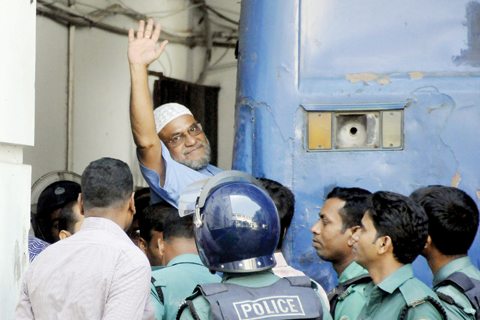DHAKA: Bangladesh hanged a wealthy tycoon and top financial backer of its largest Islamist party late yesterday for war crimes, dealing a massive blow to the group’s ambitions in the Muslim-majority nation. Mir Quasem Ali, a key leader of the Jamaat-e-Islami party, was executed after being convicted by a controversial war crimes tribunal for offences committed during the 1971 independence conflict with Pakistan.
The 63-year-old was hanged at the Kashimpur high security jail in Gazipur, some 40 km north of Dhaka, amid stepped-up security outside the prison and in the capital. “The execution took place at 10:35pm (1635 GMT),” the country’s law and justice minister Anisul Huq told AFP. Six opposition leaders have now been executed for war crimes after the secular government led by Prime Minister Sheikh Hasina set up a domestic war crimes tribunal in 2010.
With Ali’s death, all five top leaders of the Jamaat party have been hanged, a massive setback for the Islamists in the world’s third largest Muslim nation. After the Supreme Court rejected his final appeal against the penalty on Tuesday, Ali declined to seek a presidential pardon, which would require an admission of guilt, paving the way for his execution. Prosecutors said Ali was a key commander of the notorious pro-Pakistan militia in the southern port city of Chittagong during the war, and later became a shipping, banking and real estate tycoon.
The war crimes trials have divided the country, with supporters of Jamaat and the main opposition Bangladesh Nationalist Party (BNP) branding them a sham aimed at eliminating their leaders. The executions and convictions of Jamaat officials plunged Bangladesh into one of its worst crises in 2013 when tens of thousands of Islamist activists clashed with police in protests that left some 500 people dead.
Family members met Ali for the last time in the prison just hours before he went to the gallows. “All along he said he was innocent. He said he is being killed unjustifiably,” said Tahera Tasnim, one of Ali’s daughters after 23 members of his family met him. “He said this repressive government is killing them (Islamist leaders) to stop Islam being established in the society and the country,” Tasnim told AFP. Ali had helped revive Jamaat and made it a potent force in Bangladesh politics by setting up charities, businesses and trusts linked to it after it was allowed to operate in the late 1970s.
Before he was arrested in 2012, Ali headed the Diganta Media Corporation, which owns a pro-Jamaat daily and a television station that was shut down in 2013 for stoking religious tensions. He was convicted in Nov 2014 of a series of war crimes including the abduction and murder of a young independence fighter. Defense lawyers have said the charges against him were baseless.
His son Mir Ahmed Bin Quasem, who was part of his legal defense team, was allegedly abducted by security forces earlier in August, which critics say was an attempt to sow fear and prevent protests against the imminent execution. Jamaat, which is banned from contesting elections, has labeled the charges against Ali “false” and accuses the government of exacting “political vengeance”.
Russel Sheikh, a senior police official, told AFP that officials had taken the “highest security measures” ahead of the execution for fear of violence by his Islamist supporters. More than 1,000 police were deployed in Gazipur and hundreds of paramilitary border guards were outside the prison and in Dhaka, security officials told AFP. Rights groups have criticized the war crimes trials, saying they were flawed and lack any foreign oversight.
A group of United Nations human rights experts last week urged Bangladesh to annul Ali’s death sentence and to retry him in compliance with international standards. But Hasina’s government has defended the trials, saying they are needed to heal the wounds of the conflict, which it says left three million people dead. Independent researchers put the war toll much lower. When Bangladesh’s independence war broke out, Jamaat opposed the struggle, siding with the military regime in Islamabad. – AFP











